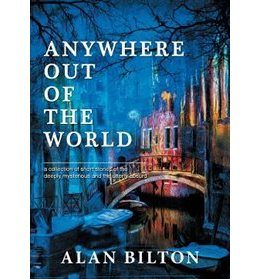In a year such as 2016 moments of escapism can offer a much-needed distraction from realities of the outside world. Alan Bilton’s latest collection of short stories, Anywhere Out of the World, will be ideally suited to anyone looking for such a distraction. In this collection of eighteen stories Bilton explores the way the mind expands and magnifies fear and the unknown, encouraging readers to consider how we approach life and the parts of it of which we cannot make sense. At one point Bilton depicts a character who poses the question ‘who was to say what was the end and what was the beginning? Perhaps life didn’t travel from A to Z but constantly traded and changed’, a challenging thought which sets the tone for the whole collection.
The blurb on the cover, of which I am always a little wary, describes the collection as being the latest offering from a ‘cult writer’. In a time when the term ‘cult’ can seem to be overused in literature, I tend to approach books which carry that label with a certain degree of trepidation, but in this instance its use is more than justified. The collection is both intriguing and unsettling, humorous and, at times, unpleasant, but above all, it is characterised by Bilton’s trademark imagination and his ability to weave an intriguing story which is difficult to stop reading, however disconcerting it becomes. This stylistic balancing act is one which Bilton has refined through his writing to date and a recognisable style which readers of his two novels, The Known and Unknown Sea and The Sleepwalkers’ Ball will be familiar with. In this collection it takes readers around the world from Washington to Venice, with a number of unnamed locations in between.
There are moments of humour here too, although these are also tinged with the themes of uncertainty and change. The mysterious ‘Flea Theatre’ tells the story of a woman, Claire, whose husband suddenly goes missing, leaving her alone and confused about what might have happened to him. As Claire tries to piece together the mystery of her husband’s disappearance parcels start being delivered to her house, each one containing a dead flea which has been preserved, stuffed and dressed in tiny items of clothing. As the story unfolds the absurdity of the dressed fleas is positioned against ‘the dainty little boxes’ in which the insects are laid. It is testimony to Bilton’s skilful writing that the story evolves from this darkly comedic opening and becomes a tale which has much to say about the impact of loss, demonstrated through Claire’s persistent sense of attachment to her missing husband, from whom she feels she is separated ‘by a single page’. Similarly, the enigmatic ‘Letting Charlie Go’ begins by parodying popular terms which will be familiar to those working in an office or business environment, before gradually weaving them into an unsettling and bleakly humorous tale.
Structurally, the collection is varied and brings together a number of longer stories to accompany the shorter ones which make up the majority of the collection. The title story, ‘Anywhere Out of the World’, is one of these longer stories, as is the wonderfully symbolic ‘The Honeymoon Suite’. In the latter, a newly married couple find themselves separated after arriving at a hotel in Venice, during which they search hopelessly for each other in a building which almost seems to change around them. This intriguing story could perhaps have formed a longer text in its own right, showcasing, as it does, the versatility of Bilton’s storytelling and his willingness to experiment with different narrative perspectives. As interesting as the story was, there may well have been more mileage in the characters Bilton establishes here, as well as in his depiction of Venice as ‘a great jewelled cloak thrown over an enormous puddle’ and it would have been fascinating to see how this setting might have developed in a longer work.
Poignant as the stories are, there are a small number of occasions where the tension and pervading atmosphere of mystery become a little frustrating and the reader is left without a clear resolution or explanation of a sudden twist of events. There are moments when this unfinished air, which lingers at points in stories such as ‘Walla, Walla, Washington’, makes the collection seem somewhat disjointed and where the characterisation also feels a little uncomfortable. This disjointed air might have been resolved, to a certain extent, if the stories had been arranged in a different order to allow the reader a chance to settle into Bilton’s world and, perhaps, more likely to accept the whirl of images and characters which can take time for a reader to adjust to. Those approaching the collection may also find it helpful to first read through Charles Baudelaire’s poem, also entitled ‘Anywhere Out of the World’, from which Bilton quotes in the collection’s epigraph and which provided a foundation for many of the themes and images captured in the stories.
Ultimately this collection will appeal to fans of Bilton’s previous writing, but will also have much to offer any reader who is willing to suspend the realities of everyday life and enter the curious world created in Anywhere Out of the World. There’s no doubt that it’s a strange, sometimes alarming world, but it’s one which certainly reinforces the idea that life rarely travels smoothly from A to Z.
Cillian Press, £9.99











